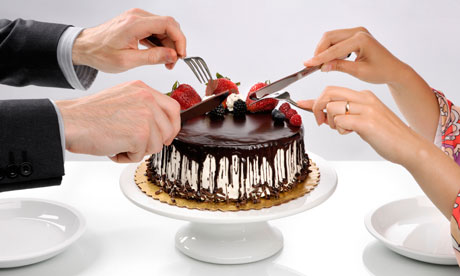
Dieting is boring. Doing it, talking about it, calculating the maths. Hearing other people's diet stories is rivalled only by hearing about their dreams for sheer conversational agony. Eat the muffin, don't eat the muffin; but while we stand here in line at Starbucks, do we have to have a three-act play about whether or not you're going to eat the muffin?
The psychodrama of whether or not to eat the muffin isn't trivial to the dieter, of course, and it's in this space – between boredom and despair – that the diet industry lives and exploits us. Every year, it dumps another January publication schedule of ridiculous titles on a pliant marketplace, depressed by having "failed" at the previous year's regime.
It's funny how absurd these things look on first viewing, and how quickly they get absorbed by the culture. Do you remember how, in 2010, when the New York Times Style Section ran that first trend piece about the Paleo diet, everyone mocked it for going so far beyond parody that it threatened to service another trend piece by actually spelling the death of something?
This January, there are at least four straight-faced Paleo cookbooks in the diet section of the bookstore (Paleo for Beginners, 40 Top Paleo Recipes, The Paleo Diet Revised and, leaving no stone unturned, Paleo Dessert Recipes), and the word has been almost entirely stripped of its ridiculousness.
Its place in the life-cycle – as a repository for scorn that somehow props up the legitimacy of the entire system – has been filled by something else that will, for a short while, be considered even more ludicrous, until it is itself replaced next January. There's a metaphor in here about capitalism that I can't quite fish out, but never mind. What a bumper year for new diet books it is!
How we consume is a measure of our wider fears and securities and in the last couple of years, popular diets have centred around re-workings of the traditional model of cutting something out, the gimmick in this case being entire food groups, sometimes under the auspices of allergies, with liberal use of the word "intolerance" and triggering fight-backs from those food industries most affected – wheat and dairy in particular.
This year, recessionary diet plans centering on denial seem, at a marketing level at least, to have given way to what might be called indulgence-based programmes. If the Paleo diet restricts you to things you could only find in the Stone Age, this year's over-correction comes in the form of the treat-yourself diet, wherein you put back all the stuff you've been told to avoid. (Spoiler alert! The trick is in portion control).
It is, as ever, Oprah's lifestyle guru Deepak Chopra who lays the broad, cultural bones of this shift with a book called What Are You Hungry For? in which he suggests that we are asking ourselves the wrong questions. To wit: not what should I eat, or how much of it, but "what are you hungry for? Food? Love? Self-esteem? Peace?" The suggestion, writes Chopra, is that "weight loss based on a deeper awareness of why people overeat" is more effective than the metrics of calorie counting.
This is not insane. Weight is often a symptom not a cause of unhappiness, and there are good health reasons for taking the holistic mind/body approach.
There are also good marketing reasons. Step forward the Marie Antoinette Diet, published this month, in which you are invited to be "inspired by Marie Antoinette's eating habits," in particular, "a recipe for the health-boosting 'wonder' soup that the queen ate for dinner every evening."
It's not about the soup, obviously. As the book blurb has it, "the French queen ate cake for breakfast and was fond of hot chocolate, but seems to have known instinctively what scientific studies have recently shown: for example, it is not what you eat, but when you eat it." This is not, you'll be surprised to hear, written by Andy Borowitz or Craig Brown but by Karen Wheeler, a fashion and beauty journalist who lives in France and found herself, while reading a biography of the French queen, wondering just how far she could run with the let-them-eat-cake trope.
This is how far: "Why eating cake for breakfast promotes weight loss."
It makes the claims of The No Excuses Diet by Jonathan Roche, published last week and promising weight loss "without dieting and without long workouts!" (by helping you "identify what truly motivates you") look positively restrained.
There are good philosophical underpinnings to some of this, and you could probably write a lively university thesis entitled All Good Diets are Anti-Diets. Research suggests that it is the smaller, attainable goals that reward, rather than radical changes that may prove unsustainable.
The problem is that a large part of the diet industry would like you to fail and come back next year for more. The best-seller lists know us too well – our lack of attention span, our need to be teased and bullied into a regimen – and reward us with built-in obsolescence.
The cycle of weight loss and gain that characterizes most individual diets, applies to the industry as a whole. You bought Atkins, you failed at Atkins and now, here it is, the title you've been waiting for, published this month and announcing a new chapter in the whole sorry cycle: Mirsad Hasic's Atkins Diet Mistakes You Wish You Knew.
If that isn't having your cake and eating it, I don't know what is.

